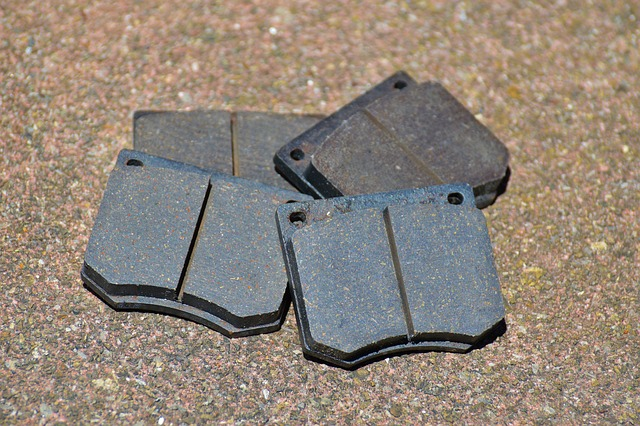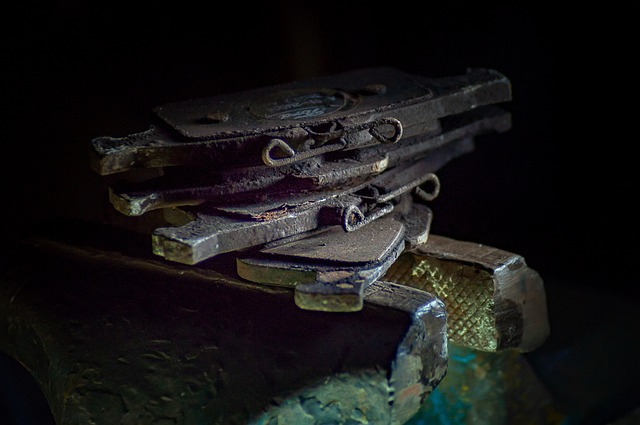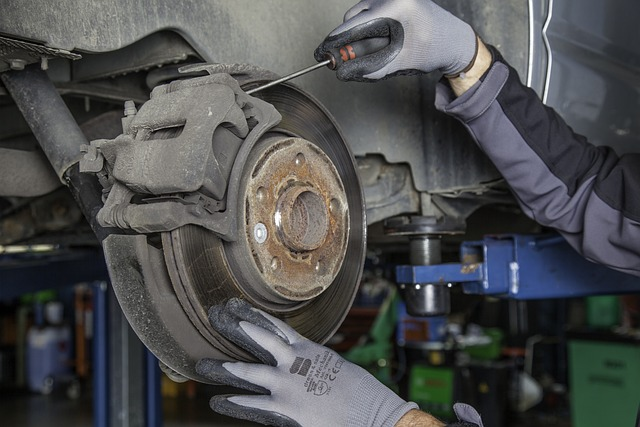Why Are My Brakes Creaking And Squeaking?

Do you hear a loud, high-pitched squeaking sound when you press your brake pedal? You’re not alone. Squeaky brakes are a common issue and can be caused by several different factors.
The good news is that most of the time, these problems can be fixed by inspecting and servicing your brake components.
In this article, we’ll discuss the causes of brake squeaking and how to fix them.
No matter what kind of vehicle you own, it's important to keep up with regular maintenance so that your brakes remain in top condition.
By understanding why brakes are squeaking, you'll be able to identify any potential issues quickly and have them resolved before they become more serious problems down the road.
So let's get started!

Causes of Brake Squeaking
You may be wondering why your car has that annoying sound when you press down on your brake pedal - it's likely due to a few common causes of brake squeaking.
One of the primary culprits is degraded pads, which occur when the friction material used on the pad wears down and becomes thin. If this happens, it can cause metal to metal contact between the brake caliper and rotor, resulting in a high-pitched squealing sound during braking.
Another possible cause of squeaking is pad misalignment; if the two pads are not aligned properly against each other, then they can produce a grinding or scraping noise as they move against one another.
Another issue could be air pockets in the brake system or insufficient lubrication that causes a rattling sound.
Finally, brake dust accumulation may also contribute to squeaking brakes; if there is an excessive amount of dust build up around the rotors and calipers, then this can affect their performance and lead to unwanted noises when braking.
All these issues should be addressed promptly by an experienced mechanic for optimal safety and performance.

Worn Brake Caliper Or Pads
If your car is makin' a racket when you hit the brakes, it could be due to worn brake pads. Brake pads wear over time as friction wears brake material down over time, which decreases their ability to stop the vehicle. In addition, braking performance can be affected by pad design, heat buildup from repeated use, and accumulation of brake dust or other debris from the road.
The main indicators of worn brake pads include:
Lessened stopping power.
Brake Failure.
Creaking noise.
Increased noise such as squealing or squeaking.
If a screeching sound occurs only when braking at low speeds or when coming to a complete stop, then it’s usually an indication that the pads are in need of replacement. Additionally, if there's unwanted vibration while driving or high temperatures after extended usage then these can also signal worn brake pads or a critical failure in one of your braking systems.
In order to replace them correctly and safely, make sure that you purchase quality friction material with appropriate properties for your vehicle type. Ensure that all components work properly under high temperatures and heavy loads. It's also important to note that some vehicles may require special tools for installation, so you should consult with an automotive specialist before attempting any repairs yourself.

Low-Quality Brake Pads
Poorly manufactured brake pads can lead to decreased performance and increased noise, such as squealing or squeaking, when you hit the brakes. The quality of the brake pad materials matters for both safety and performance. Low-quality pads may be constructed with subpar materials, which could cause issues such as overheating brakes, brake fluid leaks, and contamination of brake fluid that result in premature wear.
The type of material used in a low-quality pad is important too. Metal fibers are frequently added to the braking material to reduce heat buildup on the contact surface between rotor and pad. If these metal fibers are not evenly distributed throughout the pad it can increase squealing noise due to vibration during braking. Additionally, if metal fibers are not strong enough they can corrode quickly leading to reduced lifespan of the pads.
In order for a vehicle's braking system to perform optimally it needs high quality pads made from durable materials that distribute heat evenly across the contact surface between rotor and pad while also providing effective stopping power without excess noise or vibration. Without proper care and maintenance of your vehicle's brakes this optimal performance cannot be achieved, putting you at risk for dangerous driving conditions in an emergency situation.

Moisture and Contamination
Moisture and contamination can drastically reduce the effectiveness of your brake pads, resulting in decreased stopping power and increased noise.
Rust accumulation is one of the most common causes of impaired brakes, as it corrodes the metal components that make up the braking system. Dirt buildup on brake pads is another issue, as it acts like a barrier between the pad and rotor, allowing for less friction upon contact.
Brake dust is also a major contributor of the squeaking sounds coming from your brakes, and if left unchecked, can cause damage to other parts such as calipers or wheel cylinders. Oil contamination from leaking seals or worn caliper pins can lead to decreased performance due to reduced friction between components.
In addition, when brake fluid isn't replaced regularly or gets contaminated by dirt particles over time, it can cause additional rusting and wear out parts quicker than usual.
A few preventive measures you should take include regularly checking for any signs of corrosion or rust on your brake surfaces; cleaning off any excess brake dust with an approved cleaner; avoiding oil contamination by having your seals checked frequently; and replacing old brake fluid with fresh fluid at regular intervals. This is a reason why scheduling your next brake service is so important at the first time you experience a problem.
If you maintain these habits throughout its lifespan, your braking system should remain in optimal condition while keeping its noise levels low. It's important to note, however, that if rust has built up significantly on any part of your brakes, then you may need to replace them entirely in order to restore proper functioning.

Glazed Brake Rotors
Regularly inspecting your braking system for signs of glazed rotors can ensure that your vehicle's brakes are functioning optimally and safely.
Glazing occurs when a buildup of abrasive particles, dust accumulation, or extreme weather conditions cause the brake rotor to become smooth and shiny. This can result in decreased stopping power and higher temperatures due to lack of friction when you press on the brakes. Uneven wheel alignment can also increase the likelihood of glazing.
To diagnose glazed rotors, look for these signs:
Bright spots on the rotor surface.
A decrease in braking power.
High temperature when pressing the brake pedal.
Surface rust accumulates.
If you do find signs of glazing, it's important to have them replaced as soon as possible. If left untreated, it could lead to more costly repairs - such as a warped rotor or replacement calipers - down the line.
Taking preventative action now could save you time and money later on.

Improper Installations
If your new brakes are showing signs of poor performance, it could be due to an improper installation. A common cause is incorrect fitting, which can lead to debris accumulation and rust accumulation in the braking system. Faulty hardware or wheel alignment issues can also contribute to a faulty brake installation.
Improperly installed brakes can lead to a range of issues that may go unnoticed until there is significant damage done. Uneven wear and tear on components, as well as excessive noise when applying the brakes, are all symptoms of a bad installation. When this occurs, it’s important to take swift action and check for any damages that need replacement or adjustment. In some cases it’s best to replace the entire set if the issue persists after making repairs.
Taking these steps will help ensure your car functions properly without putting you at risk on the road. A bad pair of brakes can negatively impact your car even at low speed travel.
Loose Brake Components
Apart from improper installations, another common cause of squeaky brakes is loose brake components. The hardware that holds the brakes together, such as bolts and nuts, can become loose over time if they weren't correctly fitted in the first place or due to a lot of use.
As this hardware becomes out of alignment, it can lead to your brakes squeaking when braking. Additionally, contaminated brake fluid or brake dust can also cause your brakes to squeak as you apply them. This is because these contaminants act like abrasive particles, which create friction between your brake pads and rotors specific contact points when you press the pedal, resulting in a squeaking sound.
Soft brake pads are also known to produce a high-pitched squealing noise, which will become more audible if they become worn down over time.
Warped Brake Rotors
You may find that your brakes are making a loud screeching sound when you apply them, which could be due to warped brake rotors.
When wheel misalignment occurs, the contact between the brake pad and rotor can become uneven, resulting in paint damage as well as pad corrosion. This uneven contact will cause heat buildup on one side of the rotor more than the other and create a warping effect.
Warped rotors can also be caused by debris buildup or simply worn out pads and shoes that need replacing. If left unaddressed, this can lead to poor braking performance with increased vibration and noise during stops.
To avoid these issues, it is important to regularly check your brakes for any signs of wear or tear such as discoloration, scoring or evidence of debris build-up on the rotors.
Incorrect Brake Pad Compound
When you hear your brakes squealing, it may be due to an incorrect brake pad compound. The composition of the brake pads matter when it comes to stopping safely and quietly. It's not uncommon for a vehicle owner to replace their brake pads with the wrong type of material or one that has too little friction.
This can result in ineffective lubrication, poor maintenance, overheated brakes, and dust accumulation. Incorrect brake pad compounds can also cause a loss of braking performance, which can be dangerous while driving.
As such, it's important to ensure that your vehicle's brakes are regularly inspected by a professional mechanic and that only the right type of materials are used when replacing parts. Without proper maintenance and care, an incorrect pad compound could lead to more serious issues like decreased stopping power and damage to other components in the system.
Therefore, it's essential to invest in quality brake components and have them installed correctly in order for your brakes to perform as expected.
Faulty Caliper Pistons
Faulty caliper pistons can be a real pain, making it hard to stop safely and quietly. Faulty parts, rust issues, caliper corrosion, poor fluid, and dust buildup can all cause problems with the piston's ability to function correctly.
In extreme cases, this can lead to squeaky brakes due to the inability of the pads or shoes to make contact with the rotors or drums properly. When caliper pistons become stuck from corrosion or rust build up over time, they may not be able to extend fully when braking is applied. This causes one side of the vehicle's brake system to work harder than the other resulting in uneven wear on both pads and rotors as well as an overall decrease in braking performance.
Furthermore, any dirt or debris that has built up inside a stuck piston may act like sandpaper between the pad and rotor causing screeching noises when brakes are applied. In order for your brakes to work properly and provide you with optimal stopping power without squeaking, it's important that your caliper pistons remain free-floating so they respond quickly when you press down on your brake pedal.
If they become stuck due to rust or corrosion buildup, then you'll need to replace them before continuing use of your vehicle in order to ensure safe operation while driving.
Frequently Asked Questions
What can I do to prevent brake squeaking?
If you're experiencing noisy brakes, there are a few things you can do to prevent the squeaking.
First, check the brake fluid level and top it off if necessaryThen inspect the pad condition to make sure they're in good shape; if they need replacing, be sure to use pads that are compatible with your vehicle's braking system.
Additionally, try using brake cleaners on all of the components including rotors and calipers to remove any debris or buildup that could be causing friction and noise.
Taking these steps should help reduce or eliminate any squeaks coming from your brakes.
Is it safe to drive with squeaky brakes?
Driving with squeaky brakes can be dangerous, as it's likely a sign that your brakes are in need of maintenance.
The most common cause of brake noise is due to improper bedding-in after new brake pads are installed, but there are several other causes and remedies for this issue depending on the type of brakes you have.
It's important to inspect your brakes regularly and check for wear and tear, as neglecting these items may lead to further damage down the line.
If you're experiencing squeaking noises, it's best to have an experienced mechanic take a look at your brakes before continuing to drive.
How often should I get my brakes checked?
You should get your brakes checked on a regular basis in order to reduce noise and ensure optimal brake performance. This includes inspecting the brake pads or linings for wear, cleaning the brakes, lubricating them as needed, and checking other components such as calipers and hoses.
The cost of inspection can vary depending on the parts that need to be replaced, but it's always best to have a professional check them at least once a year. Regular maintenance will help keep your car running safely and prevent unnecessary repairs down the line.
How much does it cost to replace brake pads?
Replacing brake pads is an important part of maintaining your car and keeping it running safely. The cost to replace brake pads depends on the type of brakes you have, such as drum brakes or disc brakes, as well as the type of pad you choose.
Drum brakes are less expensive to replace than disc brakes and usually run in the range of $50-$150 per axle for parts and labor. For disc brakes, expect to pay anywhere from $100-$300 per axle for parts and labor.
It's also important to check for any other issues that may be causing brake noise, such as worn rotors or drums, low brake fluid levels, or wheel alignment issues.
Are there any warning signs of brake problems?
When it comes to warning signs of brake problems, there are a few key indicators you should look out for.
Firstly, if your brake fluid is running low, this can cause a decrease in the braking power of your vehicle.
Secondly, dust buildup on the rotor or caliper can also create a decrease in braking power.
The pads and rotors may also have wear indicators that will alert you when they need to be replaced.
No matter how hard you press down on your brake pedal your car will not slow down.
Rotor rust is another indicator of potential brake problems; if you notice rust forming on rotors, it's time for them to be replaced or resurfaced.
Lastly, depending on the pad composition, some types may make more noise than others when they become worn down and need replacement.
Conclusion
It's important to understand why your brakes are squeaking, since the cause can range from simple wear and tear to something more serious. Fortunately, most of these causes are easy to fix.
Worn brake pads and low-quality brake pads need to be replaced with good quality ones. Moisture and contamination should be cleaned off regularly. Loose brake components need to be tightened up, warped rotors need to be resurfaced or replaced, and incorrect pad compounds need to be switched out for the right ones.
Finally, if your caliper pistons are faulty you'll likely want a professional mechanic's help in inspecting and replacing them as necessary. Taking care of these issues will keep your brakes squeak-free!